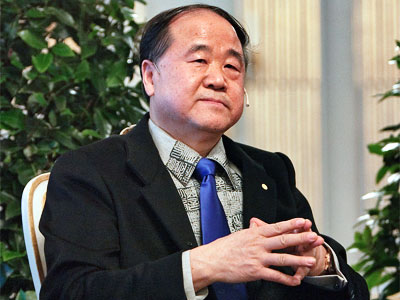Mo Yan's Delicate Balancing Act
Mini Teaser: China's Nobel-winning writer has been heavily criticized for being too close to the regime. Yet a close reading of his work shows he's far more complicated than his critics think.
As with his recurrent scenes of defecation and urination, Mo often treats sexuality as an irresistible, bestial force of nature. Yet sexuality can also offer a path to redemption. Jiefang cannot resist his passion and loses his worldly station as a result. But Mo also foregrounds passion’s redemptive power, as when making love speeds Jiefang’s recovery after thugs hired by his wife viciously beat him. And in the end, the wife who refused to grant him a divorce forgives him on her deathbed, and Jiefang reconciles with his family once he is able to marry his lover.
More than a painter of pleasure, Mo Yan is a master of the sensuality of pain. The flaying alive and skewering of prisoners and the beating and burning of Ximen Ox are just a few of numerous scenes of graphic violence in Mo’s works. The description of the ox’s beating will bring a reader to tears, but Mo’s narrators at other times seem to exult in the sound of whips striking bodies, the vivid red of dripping blood and the stench of burning flesh.
Why is there so much suffering in Mo’s works? In his many indelible scenes of pain, Mo confronts history and ideology as these forces mark human bodies. By making his characters’ bodily experiences the parchment on which he records his chronicles, he avoids direct criticism while still testifying to history’s horrors. In Big Breasts and Wide Hips, when a party VIP sentences to immediate death the young children of a Nationalist officer framed for rape, the scene makes a mockery of violence sanctioned in the name of revolution: “On the surface, we’ll be executing two children. And yet it’s not children we’ll be executing, but a reactionary, backward social system.”
Might Mo put his characters in profoundly harrowing circumstances in the hope that their suffering might offer a healing catharsis? His sensuality—both of pain and of pleasure—may be key to Mo’s underlying faith in redemption. The sensuality of suffering reminds one of Christian penitents who find ecstasy in pain. He may even present the visceral shock of pain to awaken the empathy that could build a better future. Even as we wince at the savagery, we might thank Mo Yan, as the narrator of “Abandoned Child” thanked the watchdog that bit him for his “sudden awakening through pain.”
In grappling with human aggression, Mo invites readers to confront the dark depths of the human psyche. Under the duress of that darkness, in a world of extreme greed and corruption, his most sympathetic characters also vindicate the human spirit through their passion for life and their abiding devotion to others. The life force that runs through Mo’s fiction powers destruction, but it also powers what the narrator of Red Sorghum calls “the iron law of love.”
I RETURN now to the critics who condemn what they see as Mo’s acquiescence to his government’s repression. Much of the recent press coverage relies on a binary classification of progovernment versus dissident writers. But astute readers recognize his veiled yet clear political critiques. As literary historian and critic Steven Moore wrote in a 2008 review in the Washington Post, “Over the last 20 years, Mo Yan has been writing brutally vibrant stories about rural life in China that flout official party ideology and celebrate individualism over conformity. (How he has escaped imprisonment—or worse—I don’t know.)”
Mo is neither an apologist for the government nor a reflexive dissident. “A great writer,” he avers, “has to be like a whale, breathing steadily alone in the depths of the sea.” He believes in individual conscience even as he takes seriously the contradictions within individuals. His characters don’t generally exhibit the uncorrupted core of individual selfhood common in American fiction. Yet the characters who might qualify as heroes evince an almost-libertarian allegiance to personal freedom.
One such character is Blue Face, the sole remaining independent farmer in Life and Death Are Wearing Me Out. A thorn in the side of the Commune, Blue Face demands respect for his independence in a passage that might convey Mo’s personal statement of apolitical tolerance:
No, independent farming means doing it alone. I don’t need anybody else. I have nothing against the Communist Party and I definitely have nothing against Chairman Mao. I’m not opposed to the People’s Commune or to collectivization. I just want to be left alone to work for myself. Crows everywhere in the world are black. Why can’t there be at least one white one? That’s me, a white crow!
Just as Mo Yan’s metanarrative techniques repeatedly challenge the existence of any unitary truth—whether voiced by the government or by dissidents—it might be wise to accept him as a nuanced, even contradictory, but ultimately principled and heartfelt writer.
Sabina Knight is an associate professor and director of comparative literature at Smith College.
Image: Wikimedia Commons/Bengt Nyman. CC BY 2.0.
Image: Pullquote: Mo voices political criticism that would risk reprisal if presented overtly. But since he presents his critique on the sly, often poking fun at himself as a writer, he is allowed to pursue his truth telling.Essay Types: Essay
Pullquote: Mo voices political criticism that would risk reprisal if presented overtly. But since he presents his critique on the sly, often poking fun at himself as a writer, he is allowed to pursue his truth telling.Essay Types: Essay 